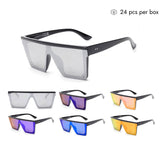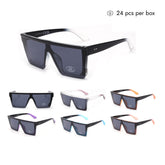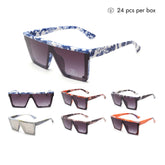How Keyword Research Powers Your Sunglasses Sales Strategy
Introduction:
In the world of e-commerce, where the online marketplace shines bright with an array of products, selling sunglasses is not just about offering stylish shades—it's about ensuring your product reaches the eyes of the right customers. The key to this? Effective keyword research. This powerful tool bridges the gap between your sunglasses and potential buyers by optimizing your digital presence for search engines. In this blog, we delve into the intricate relationship between keyword research and boosting sales in the competitive world of sunglasses retail.
Understanding Keyword Research:
Keyword research involves identifying the specific words and phrases (keywords) that your target audience uses when searching for products like sunglasses online. It's a strategic process that helps tailor your website content, product descriptions, and marketing campaigns to align with consumer intent.
Why Keyword Research Matters for Sunglasses Sales:
1. Relevance & Visibility:
By targeting the right keywords, you ensure that your sunglasses appear in search results when customers are actively looking to buy. For instance, long-tail keywords like "polarized sunglasses for beach wear" can attract buyers with a clear purchase intent.
2. Competition Analysis:
Understanding which keywords your competitors rank for provides insights into market gaps and opportunities. You can then create more targeted content or optimize existing pages to outrank them.
3. Content Optimization:
Keywords inform your content strategy, guiding the creation of blog posts, product descriptions, and FAQs that address customer queries directly, enhancing user experience and driving conversions.
Steps to Effective Keyword Research for Sunglasses Sellers:
1. Define Your Target Audience:
Who are you selling to? Understanding demographics, preferences, and shopping behaviors helps identify relevant search terms.
2. Brainstorm Initial Keywords:
Start with broad terms like "sunglasses," "UV protection glasses," and expand to include specifics like brands, styles, and features.
3. Use Keyword Tools:
Google Keyword Planner, SEMrush, and Ahrefs can provide data on search volume, competition level, and suggest related keywords.
4. Analyze Competitor Keywords:
See what keywords your competitors rank for using tools like SimilarWeb or Moz. Identify gaps where you can offer unique value.
5. Long-Tail Keywords Focus:
Prioritize long-tail keywords as they tend to have less competition and indicate a higher buyer intent. Examples include "affordable designer sunglasses" or "best sunglasses for round faces."
Integrating Keywords into Your Sunglasses Marketing Strategy:
● Optimize Product Pages:
Incorporate keywords naturally into product titles, descriptions, and meta tags without compromising readability.
● Content Marketing:
Create blog posts around topics like "how to choose the right sunglasses for your face shape" or "top sunglasses trends for summer," weaving in keywords seamlessly.
● Social Media & Ads:
Use keywords in social media captions and paid ad campaigns to enhance visibility across platforms.
Conclusion:
Keyword research is the compass that guides your sunglasses business through the vast digital landscape, directing you towards customers who are ready to make a purchase. By investing time in understanding and implementing targeted keywords, you can increase your online visibility, outshine competitors, and ultimately drive sales. Remember, the key to selling sunglasses isn't just about having a great product—it's about making sure the right people find it at the right moment. So, put on those keyword research glasses and let the sunshine of success illuminate your path.















